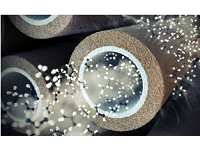Hollow Fibers for Separations

Technology Description:
Georgia Tech Research Corporation will develop hollow fiber membranes containing metal-organic framework (MOF) thin films to separate propylene from propane. The nanoporous MOF film is supported on the inside surfaces of the tubular polymeric hollow fibers. Chemicals introduced into the center of the tube are separated through the MOF membrane by a molecular sieving process. Traditional olefin production processes are performed at pressures up to 20 bar, requiring large energy and capital costs. A key feature of the team’s technology is the ability to synthesize membranes at near-ambient liquid-phase conditions and perform olefin separation at lower pressures as low as 6 bar. As the team evaluates using its MOF membranes to separate propylene from propane, the team will also develop detailed correlations between processing conditions, membrane morphology, and membrane performance. Another important task is to perform a detailed economic evaluation of the technology and establish its economic advantages compared to existing and other proposed technologies. The general separations concept also has potential to be used for a larger range of petrochemical and gas separations.
Contact
ARPA-E Program Director:
Dr. Grigorii Soloveichik
Project Contact:
Prof. Sankar Nair
Press and General Inquiries Email:
ARPA-E-Comms@hq.doe.gov
Project Contact Email:
sankar.nair@chbe.gatech.edu
Related Projects
Release Date:
